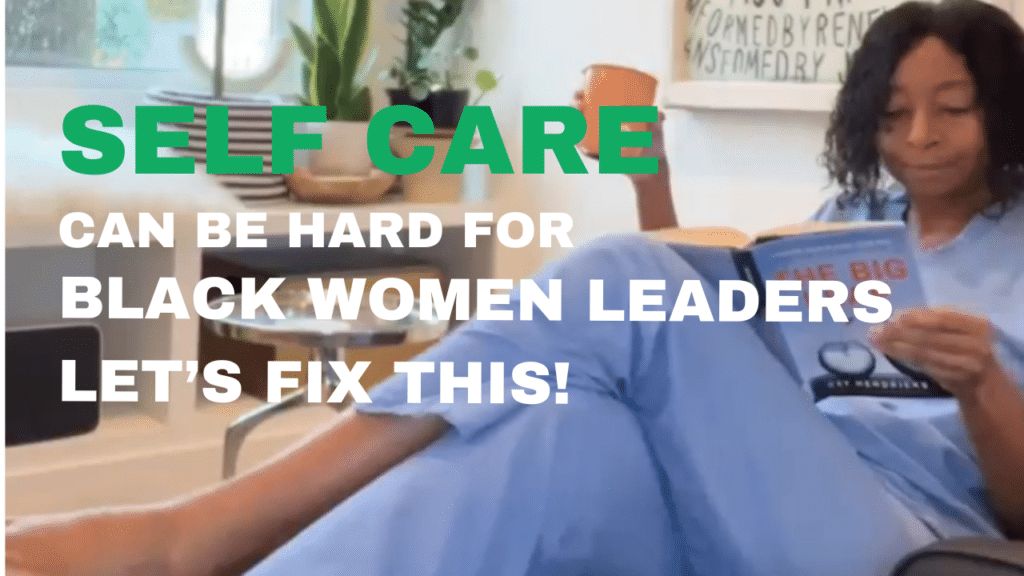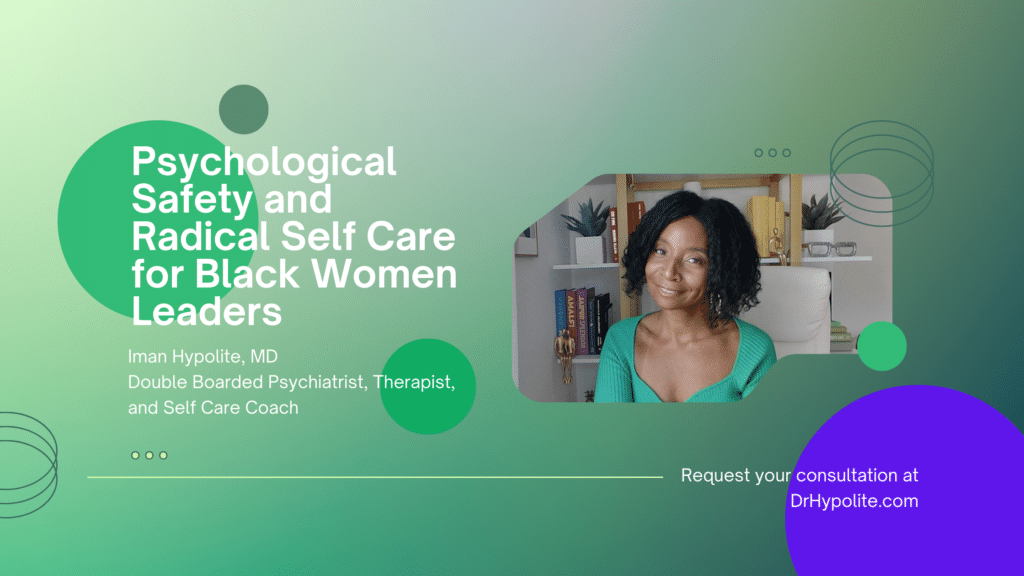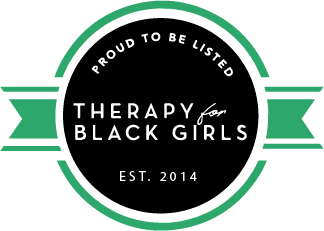Self Care for Black Women Leaders Can Be Hard. Let’s Fix This!

Self care for Black women leaders is a struggle that is hard to ignore. The costs of not engaging in self care are too high. In my work, it grieves me to see Black women struggling with their own self care, putting everything and everyone before their own needs, only to find themselves feeling depleted, angry, and unsupported. It’s time to reflect on our own behaviors and boundaries, beloveds. It’s time for change. It’s time to heal. I aim to share content that will hopefully inspire us all to engage in more self care, to see that self is not just a hash tag. It’s not just a lofty goal. It’s not just a trend. I plan to share some of my favorite strategies for self care, starting now… SELF CARE is reading books that support your growth, mindset, health, finances, relationships, and overall wellbeing. ☝🏾…Because one thing I’m going to do is read. ☝🏾…Another thing I’m going to do is invest in and prioritize things that are truly and fully MINE, like… 💚MY mental health, 💚 MY physical health, 💚 MY spirituality and faith, 💚 MY overall wellbeing, 💚 Wealth generation, 💚 MY reciprocal relationships, 💚 MY brand, 💚 MY businesses, and 💚 Things that I can actually control. 🤷🏾♀️Everything else is secondary and will be treated as such. 🙋🏾♀️Need help breaking free from giving your all to your career, leaving only scraps for yourself and the thing things that mean the most to you? Self care for Black women leaders is my specialty! 🙋🏾♀️I can help! I’m Dr Iman Hypolite, a psychiatrist, therapist, and self care and lifestyle strategist who can help you break away from patterns and habits that are no longer serving you well and to find out what self care and self love truly mean and look like for you. I am a Black woman psychiatrist, and I help Black women leaders overcome 👉🏾High Functioning Depression 👉🏾High Functioning Anxiety 👉🏾Professional and Personal Burnout When you’re ready 👉🏾 DrHypolite.com. Be well, lovelies! #blackwomenleaders #burnoutrecovery #softlife #selfcare
Psychological Safety and Radical Self Care for Black Women Leaders

Radical Self-Care and Psychological Safety for Black Women Leaders During Uncertain Times As we move through the turbulence of the 2024 presidential election season, stress and worry weigh especially heavily on Black women leaders. Many of us are grappling with heightened anxiety about the political landscape, recognizing the direct implications these outcomes may have on our communities, families, and the causes we champion. In these challenging times, radical self-care, community, and faith or spirituality become even more essential—not only for our own well-being but also for our continued resilience as leaders. As a Black woman psychiatrist, I have seen how intentional practices like these can provide a foundation of strength during times of increased societal tension. Radical self-care, coupled with psychological safety and a sense of spiritual grounding, is not a luxury; it is a necessity, especially as we face unique pressures in both personal and professional spheres. Radical Self-Care for Black Women Leaders in Challenging Times Radical self-care extends beyond the basic practices of rest and exercise; it is about caring for ourselves in deeply intentional ways, especially when stress is heightened by factors outside our control, like political uncertainty. For Black women leaders, radical self-care involves actively choosing practices that restore our minds and bodies, fortify our spirits, and create a safe space within ourselves. Key Elements of Radical Self-Care for High Achieving Black Women During Times of Societal Stress Psychological Safety for High Achieving Black Women: Building Spaces Where We Can Truly Breathe During times of heightened societal stress, psychological safety is critical. For Black women leaders who may be the sole or one of few Black voices in their workplace or community, fostering psychological safety is key. It’s about creating an environment where we can lead and express ourselves authentically, without constant worry about potential consequences. How to Cultivate Psychological Safety During Turbulent Times Embracing Radical Self-Care, Community, and Spirituality as Leadership Essentials As Black women leaders, we have always been resilient, holding up families, organizations, and movements. But in the face of heightened stress and uncertainty, we must embrace radical self-care, community, and faith as critical supports for OUR OWN health, peace, and fulfillment. It is within our community that we find strength, within our self-care practices that we find restoration, and within our faith or spirituality that we find peace. These elements create a foundation that allows us to weather the storm, to find calm in the midst of chaos, and to continue leading with purpose. In this election season and beyond, remember that you deserve to take up space, to be cared for, and to thrive—not just survive. Let community, self-care, and spirituality be the pillars that hold you up, allowing you to lead with authenticity, resilience, and strength that no challenge can shake. Ready to take you personal and professional life to the next level, request a consultation with Dr. Hypolite at DrHypolite.com today! Be well, lovelies! #blackwomenleaders #burnoutrecovery #softlife #graceovergrind #psychologicalsafetyforblackwomen #radicalselfcare
SoftLife Chat: Cultivating Emotional Endurance While Living a Soft Life – A Guide for Professional Women of Color

This video is the first of what will hopefully be many SoftLifeMD Chats. In my inaugural chat, I talk about how to cultivate endurance while waiting for your breakthrough. Often times things look the most bleak right before a breakthrough. Take a note from nature and recognize that each season brings its own beauty and challenges, and that they always change. Similarly, know that in due time, with the right mindset, efforts, and intentions, you will bear the fruits of your labor. Learning to recognize what season you’re in and how to flow within it is key to maintaining a peaceful mindset and achieving fulfillment. Let’s usher in spring with a heart of gratitude, excitement, and healthy expectation. Understanding Emotional Endurance Emotional endurance refers to our ability to withstand and overcome intense emotions, stress, and adversity without it impacting our health and wellbeing. Many of professional women of color inhabit spaces that are cutt-throat, fast-paced, and bottom-line driven, where decisions are made under pressure and uncertainties loom. In these settings, cultivating emotional endurance is vital for maintaining focus, productivity, and our overall well-being. Strategies to Enhance Emotional Stamina: The Impact of Psychological Endurance: Psychological endurance goes hand in hand with emotional resilience, encompassing our ability to adapt to change, bounce back from setbacks, exercise self-compassion, and maintain a healthy mindset in the face of adversity. As professional women of color, developing psychological endurance enables us to embrace challenges as opportunities for growth, rather than obstacles to be feared. Cultivating emotional endurance is not just a professional advantage; it’s a personal imperative if we are to thrive rather than merely survive. By honing our ability to cope with stressors in healthy ways, we empower ourselves to lead and live with confidence, resilience, and authenticity. So let’s commit to prioritizing our emotional well-being, building our psychological endurance, and embracing the journey of both personal and professional growth with grace and determination. Remember, emotional stamina is the key to sustainable success! Ready to take your personal and professional life to the next level? If you are experiencing high functioning depression or anxiety or burnout, and are ready for more, request a consultation with Dr. Hypolite today! Be well, lovelies! #professionalwomenofcolor #burnoutrecovery #softlife #graceovergrind
Did You Know Irritability Is A Sign Of Depression?

Regardless of how Black women actually show up, in US workplaces (and other settings) Black women are more often demonized and written off as ‘Angry Black Women’, when compared to others who express the same level of (or more) emotion. This implicit bias has severe adverse implications for the health, careers, and economic potential of Black women. This blog explores the role that depression, namely irritable depression, may play in these dynamics and how irritable depression goes unnoticed and unaddressed in Black women. Hi, I am Dr. Iman Hypolite, a double board certified Johns Hopkins trained psychiatrist with over 20 years of experience, and I help professional women of color THRIVE! I specialize in treating high functioning depression (including irritable depression), high functioning anxiety, and professional burnout in high achieving women of color. Irritable Depression Let’s talk irritability. Irritability is defined as getting easily frustrated, annoyed, and impatient. In physical health, a part of your body that feels irritated is accepted as a sign of pain, not such with mental health though. Let’s explore this. Irritability is one of the defining symptoms of major depressive disorder. It is often clinically referred to as irritable depression. Irritability is also a core and defining symptom of generalized anxiety disorder and Post Traumatic Stress Disorder (PTSD). Despite the fact that irritability is a core symptom of depression, anxiety, and PTSD, people and most concerning, clinicians rarely acknowledge it as such. Ignoring irritability has health, relational, and societal implications. Recent studies “validated” what Black and other culturally competent mental health clinicians have known for years, and that is that irritability is a more common manifestation of depression and anxiety in Black women. Because irritability is often not recognized as a mental health symptom, depression, especially irritable depression, is often undiagnosed, under diagnosed, and misdiagnosed in Black women. Irritability as a fight or flight response Irritability in Black women is a remnant and byproduct of 400 years of oppression and systemic racism, where Black women were the most vulnerable due to the following conditions and then some: brutal labor, recreational and institutionalized rape, forced breeding, forced childbearing, forced nursing of other women’s babies, their own babies stolen from them, beatings by men and women, macroaggressions by White women for the negative and undesired “attention” that Black women received by White men, and the list goes on. In the face of this, Black women had to figure out how to fend for themselves, their children, and their entire families. Let’s use our imaginations for a moment. What kind of coping mechanisms do you think Black women slaves had to develop in order to survive this? What do you think the lessons that Black mothers had to share with their daughters looked like back then? How do you think these lessons evolved as they were passed from one generation to the next? What do you imagine the remnants of those very same lessons look like today, in light of the fact that remnants of slavery and oppression exist even now? I challenge you to think about this. What if irritability was understood to be a remnant of intergenerational and perhaps personal trauma? What if irritability was seen as a way that many Black women express overwhelm, fear, helplessness, despair, hopelessness, sadness, stress, and hurt? What if irritability was seen as a mental health symptom rather than a character trait? Remember, no one is born irritable. Irritability is NOT a character trait. It is a symptom of a larger issue. Black women who are walking around irritable and angry are not irritable and angry for no reason. There’s always a reason behind every emotion. Have you ever taken a moment to caringly ask a woman you have deemed to be an “angry Black woman” if and why she may be angry? What if irritability were met with empathy, compassion, and concern? For example, what if a Black woman you perceive as irritable were, in a private one on one setting, caringly approached as such: The trick for this to work is that one actually has to care. If you attempt this and your motive is not sincere concern, this will show…and will not work. Black women need people to actually care about and for them. People outside and even more painfully within the Black community, often critique Black women for being intimidating, angry, masculine and hard. Do you ever wonder why and what is the basis for this? Regardless of how Black women actually show up, in US workplaces (and other settings) Black women are more often demonized and written off as ‘Angry Black Women’, when compared to others who express the same level of (or more) emotion. This implicit bias has severe adverse implications for the health, careers, and economic potential of Black women. In the increasing public discourse (*cough judgment*) about Black women, it is important to recognize that all women who are perceived as angry (or irritable) or not actually angry or irritable. There’s also bias, folks. Psychological Safety for Black Women Psychologically safe spaces need to be created in order for Black women to feel safe enough to be more vulnerable, or in other words, softer or more feminine. Black women need to be shown more grace, humanity, and understanding. Once safe spaces are created, Black women will need people to have patience and know that it will take time for Black women to shed 400 years of oppression and the resulting adaptive defenses that have been necessary to survive being the most vulnerable and lowest rung in America’s deeply embedded and still prevailing caste system. Once these safe spaces are established, Black women will need to embark on a journey and practice of vulnerability, learning to ask for and receive help, and to self-soothe and problem solve in healthy ways in the event help is not given. This is an example of how we can collectively heal and spread love! If you are a Black woman leader in need of support
Breaking the Silence: Shedding Light on Black Female Depression

Dr. Iman Hypolite is a double board certified Johns Hopkins trained psychiatrist with over 20 years of experience. She specialize in providing culturally sensitive care to high achieving women of color with depression, anxiety, and professional burnout in high achieving women of color. If you’re looking for a culturally competent women’s psychiatrist who gets it, reach out to request your consultation today! Hi, I am Dr. Iman Hypolite, a double board certified Johns Hopkins trained psychiatrist with over 20 years of experience, and I help Black women THRIVE! I specialize in treating high functioning depression, high functioning anxiety, and professional burnout in high achieving Black women and women of color. Let’s talk Black Female Depression. Before we get started, please excuse my use of the word “female”. For whatever reason, it ranks higher for #SEO, and while I am here to share education and resources, SEO unfortunately matters these days, so bear with me… In a world fixated on edifying strength and resilience, the struggles of Black women often remain hidden behind a façade of superhuman strength, but it’s time to break the silence and shed light on a topic that has long been overlooked – Black female depression. This article aims to delve into the unique experiences and challenges faced by Black women with depression. From societal expectations to historical traumas, Black women bear the weight of multiple burdens, often resulting in the suppression of their emotional well-being. This discussion is not meant to perpetuate stereotypes but rather to offer a platform for understanding and support. The hope is that by sharing this, it fosters empathy, awareness, and creates a safe space for open dialogue about and support for women suffering with Black female depression. It is time to break the silence and dismantle the stigma surrounding mental health in the Black community. The Prevalence of Black Female Depression Depression affects people from all walks of life, and Black women are no exception. However, studies have shown that Black women are disproportionately affected by depression compared to other racial and gender groups. Research suggests that Black women are more likely to experience depression and are less likely to seek treatment compared to their counterparts. The reasons behind this disparity are multifaceted, ranging from cultural stigmas surrounding mental health to the lack of accessible and culturally competent mental health services. Additionally, the intersectionality of race and gender further compounds the challenges faced by Black women, leading to increased vulnerability to depression. By understanding the unique experiences of Black women, we can begin to address this issue more effectively and provide the support needed for healing and recovery. Unique Challenges Faced By Black Women With Depression Black women face a myriad of challenges when it comes to dealing with depression. The experiences of Black women are shaped not only by societal factors but also by historical traumas and systemic inequalities. One significant challenge faced by Black women is the pressure to conform to societal expectations of strength and resilience. This expectation can often lead to the suppression of emotions and the neglect of one’s mental well-being. It can interfere with Black women’s ability to show vulnerability. It can hinder Black women from experiencing psychological safety in their workplaces, intimate relationships, family life, and overarching community. Additionally, studies are increasingly showing that the historical traumas endured by Black women during slavery and the subsequent years of systemic oppression have been passed down intergenerationally to Black women today and can contribute to the development and exacerbation of depression even now. Moreover, the unique experiences of Black women within the healthcare system can also pose challenges. The lack of representation and cultural competence in mental health services can lead to misdiagnosis, inadequate treatment, and a lack of trust in seeking help. It is crucial to address these challenges and create a more inclusive, culturally sensitive, and supportive environment for Black women struggling with depression. Societal Factors Contributing To Black Female Depression The societal factors contributing to Black female depression are multifaceted and deeply rooted in systemic inequalities. One significant factor is the burden that many Black women feel they have to fulfill multiple roles and responsibilities in their homes, families, and workplaces, that are generally not assigned to or carried out by others. The pressure to be strong, independent, and successful in various domains can take a toll on mental health. Additionally, the impact of racism and discrimination on daily life can lead to chronic stress and contribute to the development of depression and other health issues. Furthermore, the lack of representation and positive portrayals of Black women in media and society can perpetuate feelings of invisibility and low self-esteem. These societal factors play a significant role in shaping the experiences of Black women and must be addressed to create a more psychological safety for Black women. The Impact Of Intersectionality On Mental Health Intersectionality is the interconnectedness of various social identities, and it plays a crucial role in shaping the mental health experiences of Black women. For Black women, the intersection of race and gender creates a distinct set of experiences and challenges that influence mental health, physical health, and overall quality of life outcomes. The intersectionality of identities can lead to increased exposure to discrimination, microaggressions, and other forms of oppression, which negatively impact mental well-being. Moreover, the concept of intersectionality acknowledges that individuals have multiple identities that intersect and interact with one another. This recognition is crucial in understanding the complex experiences of Black women and developing targeted interventions and support systems that address their specific needs. Irritability as a Predominant Feature of Black Female Depression In many cases, irritability can be a more predominant feature of Black female depression compared to the traditional symptoms often associated with depression. Instead of expressing overwhelming sadness, tearfulness, or hopelessness, black women may exhibit irritability, physical manifestations of depression and stress, or emotional distress as primary indicators of their inner turmoil. Cultural Stigmas Surrounding Mental Health In The Black Community Cultural stigmas surrounding


